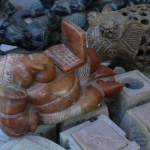This is a rather interesting article by Director General of CSIR (Council of Scientific and Industrial Research) in India on Science, Technology and Innovation. he mentions Jagdish Bose’s strive for innovation and discovery completely free from his desire for money… and links it to the latest multi-millionaires from India who are from IT and Biotech. Country is changing!
There was a time when knowledge sharing was easy and crediting the original source of knowledge posed no problems. One can illustrate this by a number of cross-cultural examples. When the Arabs imported tamarind from India, they named it Indian date, because, like the date they knew so well, the new fruit also had a stone. To Europe, the numerals were Arabic, not because the Arabs had invented them but because the Europeans learnt them from the Arab world. For Europe, William Champion was the inventor of the process to produce metallic zinc, because it was he, who introduced it successfully. It did not matter that the process had been long known in China and probably still earlier in India; but this did not cause major conflicts.
India always looked at knowledge and especially useable knowledge in a dispassionate way. It is best exemplified by a controversy that arose in 1998 concerning Sir J.C. Bose, who is one of the founding fathers of Radio Physics. A story in Telegraph carried the rather sensational title ‘Bose Invented Marconi’s wireless’. The story was based on a report that the detecting device, called Coherer, an instrument invented by Bose two years earlier was used by Marconi in his development of wireless. Let us understand the background. As early as 1895, Bose demonstrated to an excited Calcutta audience the wireless transmission of radio waves over a distance of 75 feet through masonry.
An early admirer of the Bose cohere was the British navy which used it to establish effective radio link between a torpedo boat and friendly ships. In May 1901 he wrote to his friend Rabindranath Tagore: ” the proprietor of a reputed telegraph company came himself with a patent form in hand. He proposed to take half of the profit and finance the business in the bargain. This multi-millionaire came to me abegging. My friend, I wish you could see that terrible attachment for gain in this country, that all engaging lucre, that lust for money and more money. Once caught in that trap there would have been no way out for me.”
Exasperated by Bose’s approach towards money, two of his lady friends, British-born Margaret Nobel (better known as Sister Nivedita) and American-born Mrs. Sara Bull on their own initiative obtained in 1904 an American patent in Bose’s name. The irony of the situation is interesting. Here, in Nivedita we have a spiritualist advocating the cause of patents and royalties and a physics professor dismissing the idea. The reason must be sought in their backgrounds: Nivedita was a product of industrial Europe while Bose was a child of the orientalized east. To take this point forward, it is interesting to note that while Bose had this attitude, the contemporary scientists in the western world had a clear mind especially on usable knowledge, and that did not exclude the great Einstein. Many people do not know that with Leo Szilard, Einstein obtained about 40 patents on refrigeration. In a lighthearted way, I might emphasis that neither the refrigerator nor Einstein benefited from this exercise though!
The context decides the content. There is a new context now and the wealth- making prowess of knowledge is being recognised in the new India now. Why do I say this?
The list of 100 top billionaires of Indian industry based on net worth was published recently. The top five did not include the familiar names, except one. All the other four were people, who owned industries, such as Infotech or R&D intensive pharma. A new phenomenon is also beginning to be seen in India. An R&D savvy, pharma company has developed a new molecule. It is undergoing experimental trials. Even the news that the molecule has moved up the innovation path from phase-I to phase-II enhanced the share value of this company; even though the actual molecule may not even enter the market for the next few years! What is this phenomenon? This is the emergence of Indian knowledge industry.











